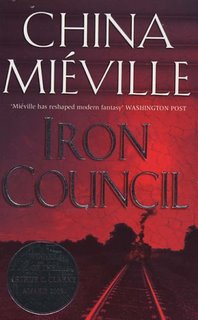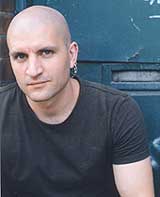 There and back again…
There and back again… This is a book which sees several strengths being played out by China Mieville. In my mind at least he has a sure way of ensuring the attention of the reader; he did this with a brilliant setting in the city of New Crobuzon, pure weirdness, and engaging characters. Thankfully this book has at least a good grounding of these to make it worth while, the award of the Arthur C Clarke testifies to this, as it did for Perdido Street Station in 2001.
The namesake of the book is the consequences that evolve from the failed attempt to form a vast railway line stretching across continents, and through inhospitable land, with the aim of better economic gains. The Iron is the train and the council is formed by a collective of disillusioned workers, camp prostitutes and one of Mieville’s more gruesome creations, the remade a class of workers from criminals and offenders that have various ‘other’ functions grafted onto, in a form of biotechnological punishment. With a lack of pay and with tensions rising, they commandeer the train, and set off to get as far away from the inevitable retribution.
The Iron council also represents a hope, a dream, a sort of figurehead for the oppressed citizens of New Crobuzon, where a decadent government is seen as responsible for the drawn out war with the shadowy neighbour of Tesh. This coupled with the forced conscription of the populace, various revolutionary splinter groups, and the infamous critical newspaper Runagate Rampant combine to create a melting pot of political and social unrest, into which the mythical Iron Council is an ever present and looming focus.
The book meanders in parts as it explores the typical ‘there and back’ scenario that surrounds the journey of the mythical train of rebels, from its position fleeing through bizarre geography to turning back to the city from where it set out. We get the viewpoints of Ori a young radical idealist in New Crobuzon, Judah Low a golem crafter of some power who seeks out the Council and Cutter his lover and erstwhile devotee. This trio of viewpoints provides great angles throughout the book, as their ideals and views are explored in terms of the consequences of their actions, and what they represent.
The book is a fairly substantial one, and it certainly has some trademark ‘weird’ moments that make it very worth the effort, Judah’s reconnaissance into the heart of a marsh land people being my favourite. It ultimately suffers from a drawn out plot arch in the return of the Iron Council to New Crobuzon, yet the range of themes are still engaging, notably the concept of social change and how they affect the future and the present. An extensive debate was conducted into all the themes intertwining the book, the end fate of the Iron Council being discussed in detail, so spoilers are abound.
 It is a very worthy edition to Mieville’s already impressive works, though it would perhaps make more sense to start with Perdido street station, as events do follow on. Though not necessary, it would give more depth to what is already a very engaging book. It’s not perfect, though there is a great deal of thought, and a lasting effect that is quite perfect, though Mieville takes his time getting there, the end is entirely justified by the journey.
It is a very worthy edition to Mieville’s already impressive works, though it would perhaps make more sense to start with Perdido street station, as events do follow on. Though not necessary, it would give more depth to what is already a very engaging book. It’s not perfect, though there is a great deal of thought, and a lasting effect that is quite perfect, though Mieville takes his time getting there, the end is entirely justified by the journey.
Iron Council - 9.5 / 10
 There and back again…
There and back again…  It is a very worthy edition to Mieville’s already impressive works, though it would perhaps make more sense to start with
It is a very worthy edition to Mieville’s already impressive works, though it would perhaps make more sense to start with 

No comments:
Post a Comment